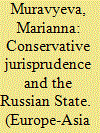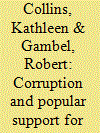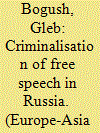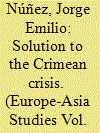| Srl | Item |
| 1 |
ID:
155853


|
|
|
|
|
| Summary/Abstract |
Vladimir Putin’s long period in power has so far raised scant discussion about the political concepts that underpin real state and societal unity, and especially about the domestic political implications of these concepts. Despite this, key concepts of his political regime, such as ‘sovereignty’ and ‘sovereign democracy’, have frequently been used in Russian political discourse. This essay examines the way the current Russian administration has used concepts that stress strong societal unity, and the creation of a stable state and societal unity to support the development of real functioning dynamics in the society. It charts the shift from ‘sovereign democracy’ to ‘sovereignty’ around 2011–2012 as a key discursive concept in moving towards a more isolationist international stand and consolidating Putin’s power by emphasising Russia’s unique political tradition, which requires a strong leader as the basis of national unity and to ensure Russian sovereignty.
|
|
|
|
|
|
|
|
|
|
|
|
|
|
|
|
| 2 |
ID:
155852


|
|
|
| 3 |
ID:
155860


|
|
|
|
|
| Summary/Abstract |
Many studies have argued that corruption undermines perceived democratic legitimacy, trust in state institutions, and government support. However, few prior studies have included transitional or hybrid regimes in their analyses, or simultaneously examined multiple aspects of this relationship. Using focus groups and a nationally representative survey conducted throughout a tumultuous transitional period in Kyrgyzstan, we find evidence for our hypotheses that citizens with greater corruption concerns will be more pro-democratic when evaluating democracy or its institutional components in the abstract; yet, they distrust existing government institutions. Even in a hybrid regime lacking democratic experience, citizens exhibit attributes of distrusting democrats.
|
|
|
|
|
|
|
|
|
|
|
|
|
|
|
|
| 4 |
ID:
155858


|
|
|
|
|
| Summary/Abstract |
The essay addresses the current trends in the criminalisation of free speech in Russia. It critically discusses the amendments to the Russian Criminal Code, criminalising various forms of public expression of opinions, adopted in the years following the presidential elections in March 2012, and questions their compliance with international human rights law. Seeking to identify the motives behind the new provisions, the article argues that the amendments are intended to cause a ‘chilling effect’, to control public dissent by selective or random criminal prosecution. Two of the new criminal law provisions—‘Public Calls for Separatism’ and ‘Rehabilitation of Nazism’—are considered in detail to illustrate the author’s conclusions.
|
|
|
|
|
|
|
|
|
|
|
|
|
|
|
|
| 5 |
ID:
155856


|
|
|
|
|
| Summary/Abstract |
National Human Rights Institutions (NHRIs) have become hallmarks of good governance and democracy. Although many countries have an NHRI, it remains unclear how they operate on the regional level in political systems where democracy malfunctions and human rights are under pressure. Drawing on interviews, this essay examines how Russian nongovernmental organisations (NGOs) established a shadow Ombudsman—the Human Rights Council (HRC)—to protest against the appointment of an Ombudsman in St Petersburg and put pressure on authorities to inaugurate a new and independent Ombudsman. Although we would expect relations between the Ombudsman and NGOs to deteriorate when civil society is under pressure, this essay finds that political repression and the persona of the current Ombudsman, Alexander Shishlov, have brought civil society and the Ombudsman closer together.
|
|
|
|
|
|
|
|
|
|
|
|
|
|
|
|
| 6 |
ID:
155855


|
|
|
|
|
| Summary/Abstract |
This essay outlines the history of international criminal law scholarship in Russia. I use a politically based explanation of the changing positive and negative attitudes regarding international criminal law, and show that the discourse on these issues in contemporary Russia is subject to serious political pressure. Changing such a situation is a difficult but essential task, mainly because of the over-riding need to free current scholarship from political control.
|
|
|
|
|
|
|
|
|
|
|
|
|
|
|
|
| 7 |
ID:
155857


|
|
|
|
|
| Summary/Abstract |
Migration policy in Russia is implemented by a variety of actors, such as state officials, market actors, and social activists. In the implementation of migration policy, they inevitably interact with one another. Having examined the categories used by the people involved in the implementation of migration policy, I explore the potential of coalition-building in this process. In order to scrutinise these fluid political forms, I make use of the concept of ‘queer coalitions’. This concept draws on literature in queer theory, which I argue is also productive for the analysis of current political actions in the migration domain.
|
|
|
|
|
|
|
|
|
|
|
|
|
|
|
|
| 8 |
ID:
155854


|
|
|
|
|
| Summary/Abstract |
Sovereignty is intrinsic to conflict in international relations. There are various sovereignty disputes around the world caught between legal and political limbo, the status quo and continuous tension, with various negative consequences for all the parties involved. It is increasingly clear that the available remedies have been less than successful, and that a peaceful and definitive solution is needed. The essay considers how theories of distributive justice, and particularly the hypothetical thought experiments proposed by Rawlsian theory, can be used productively with the concept of sovereignty and explores the possibility of a solution for sovereignty conflicts such as the Crimean case by the application of a Rawlsian methodology.
|
|
|
|
|
|
|
|
|
|
|
|
|
|
|
|
| 9 |
ID:
155859


|
|
|
|
|
| Summary/Abstract |
The article develops a typology of political strategies of coming to terms with the past as a theoretical frame of reference against which it assesses the transitional politics of memory pursued in Romanian post-communist society. It argues that after an initial ‘elusive’ strategy based on a politics of amnesia gave way to a confrontationist stance promoting a politics of anamnesis, the communist past was both politically criminalised and symbolically demonised. The article concludes by arguing that the failure of the ‘mastering the past’ paradigm epitomised by the 2006 Tismăneanu Report needs to give way to a ‘normalising’ paradigm of remembering Romanian communism.
|
|
|
|
|
|
|
|
|
|
|
|
|
|
|
|